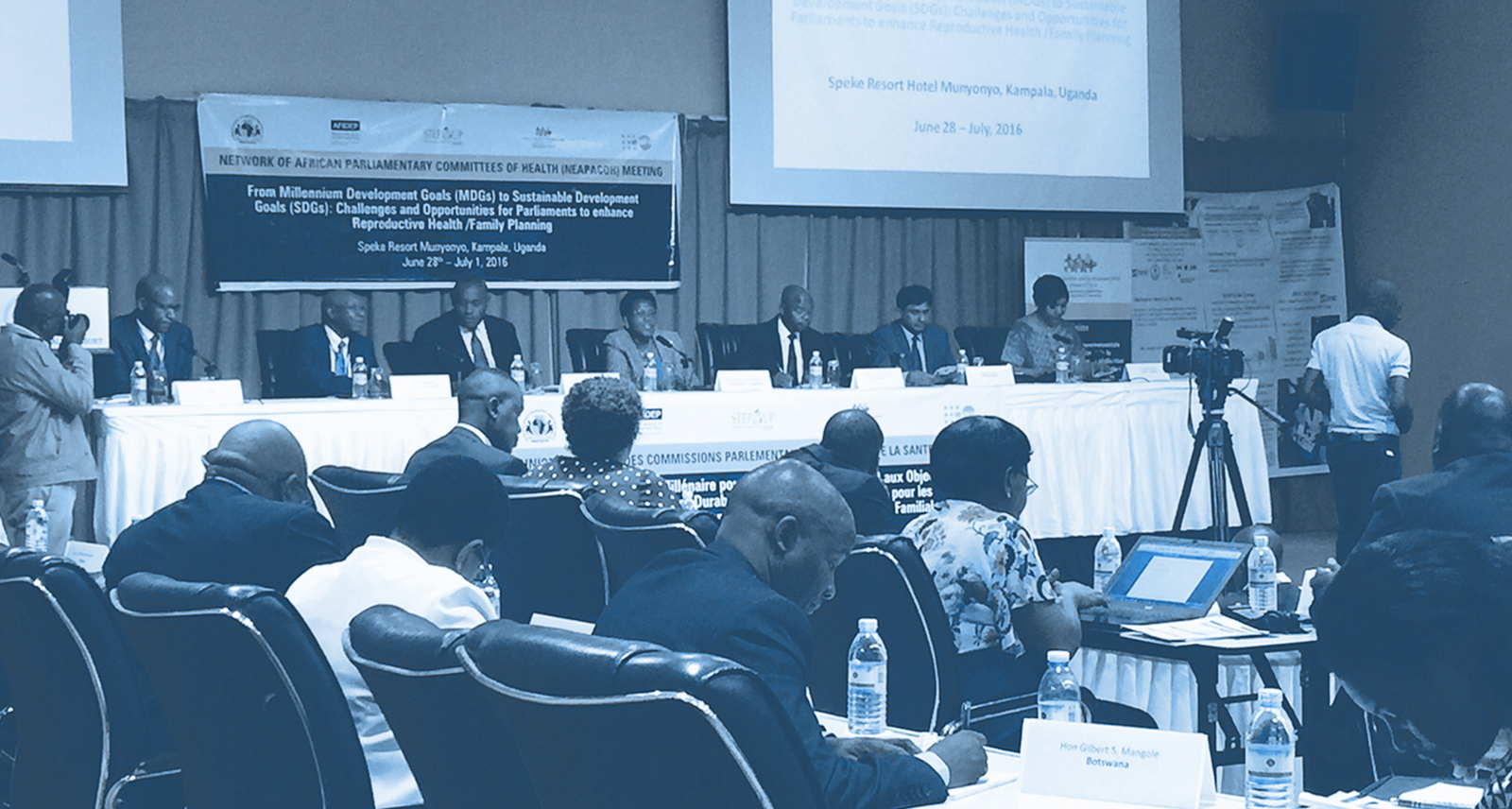Blogs

Members of parliament (MPs) make important decisions touching on citizens’ every day life. On June 29-30, 2016, Partners in Population and Development Africa Regional Office (PPD-ARO) in collaboration with AFIDEP convened the annual meeting of the Network of African Parliamentary Committees of Health (NEAPACOH) in Munyonyo, Uganda.
The forum sought to, among other objectives, deliberate evidence on urgent health issues in Africa in order to generate MPs’ commitment to tackling these issues through their oversight, legislative, and representative functions in parliament.
MPs and the Sustainable Development Goals
The meeting noted that although many African countries met some of the Millennium Development Goals (MDGs), key goals on health were not met including reducing child and maternal deaths. Child mortality decreased by 53% but fell short of the 67% target, whereas maternal mortality reduced by 40%, but fell short of the 75% target. The meeting was informed that the recently adopted Sustainable Development Goals (SDGs) had expanded the narrow scope of the MDGs to cover economic, environmental and social pillars of development with a focus on equity. The SDGs give leaders, including legislators, another opportunity to focus on urgent health and other development issues where Africa still lags behind. Specifically, the meeting called on legislators to prioritise efforts to reduce child and maternal deaths, reduce early marriages and adolescent child bearing, reduce high fertility, and strengthen health systems.
Legislators were asked to get actively involved in their country’s planning and resource appropriation to ensure that these issues get allocated more resources, but also monitor their governments’ performance on tackling these issues. Furthermore, legislators were called upon to make supportive policies and laws, push for their implementation, and champion preventive health practices and uptake of family planning services within communities.
MPs have a central role in countries’ efforts to harness a sizeable demographic dividend
The demographic dividend is the economic benefit arising from a significant increase in the ratio of working-age adults relative to young dependents. For countries to harness a demographic dividend, they need to prioritise efforts that will reduce fertility considerably because this is what will open the window of opportunity for growth by creating an age structure dominated by working age youth and adults. These efforts to reduce fertility need to go hand-in-hand with meaningful and sustained investments in education, health, and empowerment of women and youth; economic reforms to create quality jobs; and reforms of public institutions to ensure proper management of public resources and accountability.
In the last three years, the demographic dividend paradigm has generated a lot of interest among top government officials in African countries as an important pathway for transforming their economies. Indeed several countries are currently working with AFIDEP And UNFPA to explore how they can reform their policies and governance, as well as increase investments in key sectors in order to harness a sizeable demographic dividend in the next 30 years.
Analyses conducted by AFIDEP show that African countries can increase their gross domestic product (GDP) nearly ten-fold in 30 years if they invest in family planning programmes to reduce fertility, invest in health and women empowerment, invest in transformative education and quality job creation, and address governance issues such as the rampant corruption on the continent.
MPs were called upon to:
- Add a strong voice to their countries’ demographic dividend programmes and create public awareness on the demographic dividend as well as bring communities’ views into high-level dialogues on the demographic dividend
- Prioritize social development sectors as much as they prioritise economic infrastructure because it is healthy, empowered and highly educated people with quality jobs who drive transformative economic growth
- Champion family planning, empowerment of women, and education system transformation
- Strengthen oversight on programme implementation and accountability in use of public resources
- Champion evidence-informed decision-making by supporting efforts to strengthen local capacity in evidence generation, knowledge translation and use, and advocacy
Commitments
As expected, MPs made commitments to undertake a number of actions in their countries to tackle the challenges highlighted by the forum ranging from increasing budgets for family planning programme, championing preventive health practices and uptake of family planning among communities, advocating for increased investments in maternal health programmes, and close monitoring of government programmes aimed at tackling these issues.
The forum was attended by more than 20 MPs from parliamentary health committees of 18 countries in Africa. MPs reported their country’s achievements on their 2014 commitments, with many highlighting increases in budgets for family planning programme as well as legislative reforms to tackle health issues. The Malawi committee was lauded for having introduced a budget line for family planning as well as spearheaded the passing of the Marriage Law that increased age at marriage to 18 years in order to reduce early marriages and teen childbearing. More details on the country reports and the forum generally can be found here.
AFIDEP made three presentations at the forum:
- Strengthening evidence use in parliament: the role of MPs
- Enhancing the demographic dividend for socioeconomic transformation in Africa: the role of parliamentarians
AFIDEP’s technical and financial contribution to this annual forum is part of the Institute’s sustained efforts to enable deliberation and translation of evidence into policy decisions and action. Currently AFIDEP’s programme supporting this forum is funded by the William and Flora Hewlett Foundation.
Related Posts





